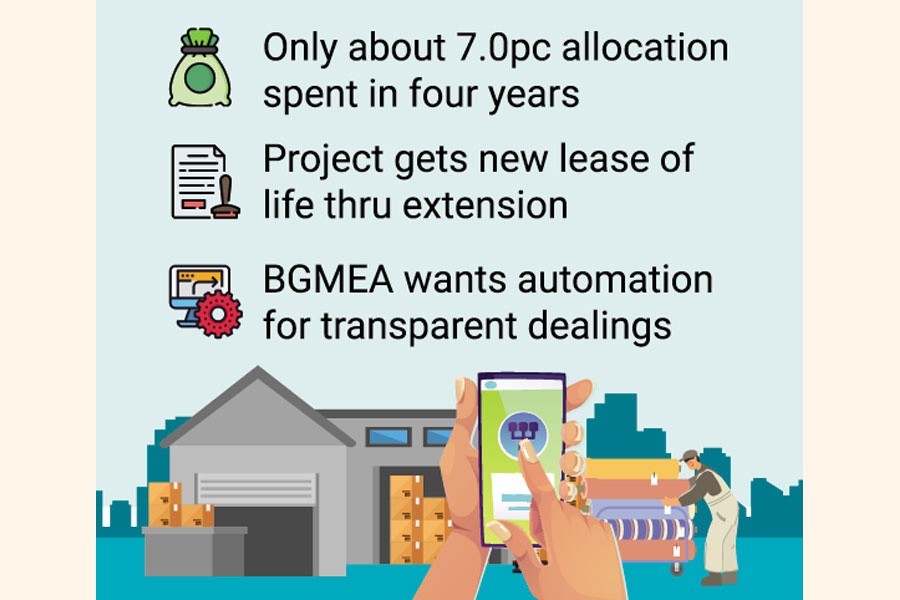
Published :
Updated :

Bond-management automation could use hardly 7.0 per cent of allocated funds in four years, with the project apparently put on the backburner while some "unduly" enjoy duty-free buy.
People involved with the automation works say any change in its procedures needs consensus of the stakeholders as the bonded-warehouse facility is considered one of the most sensitive fiscal incentives for export sectors of the economy.
This requisite consent of all across the board provides a ploy for putting the priority task on the backburner, according to them.
"A vested quarter is active to make the progress of work slower as transparent bond-management system would plug the holes of duty evasion," says one.
Under bonded-warehouse facility, cent-percent export-oriented sectors enjoy duty-free import of raw materials while diplomats and privileged persons can also avail diplomatic bonded-warehouse privileges.
A number of relevant entities, both in public and private sectors, are involved with this. The stakeholders include exporters, Bangladesh Export-Processing Zones Authority (BEPZA) and Bangladesh Bank (BB).
The project has got extension of lifespan until June 30, 2023 as its tenure was scheduled to expire on June 30, 2021.
To check abuse of the duty waiver, the National Board of Revenue (NBR) under the Internal Resources Division (IRD) launched the bond-automation project in 2017 with a cost of Tk 811.511 million.
The automation work on the bond management to bring discipline in the duty-free facility, involving Tk 300 billion worth of revenue, has so far recorded 60 per cent of its target, says a senior NBR official.
He explains how spending from the allocation shows such a peanut against the extent of project execution. "The project expenditure remained low so far as this type of technical- contract payments takes place at the end of projects," the official says.
Automation of the bonded-warehousing is deemed imperative to ensure a 'win-win situation' for some priority sectors, including apparel exporters.
Some officials claim some significant progress made recently on the project, including the signing on a main purchase package of IT-system software with Rive Systems Limited on May 6, 2021.
After the deal signing the company has already submitted inception report, project timeline and software requirement specification (SRS) to the project office.
Currently, work on software development is underway.
Another purchase package on IT infrastructure-and LAN/WAN- installation procurement activities also completed on May 30, 2021. An agreement has been signed with Global Brand Private Limited in this connection.
As per second revised development-project proposal, some Tk 930 million has been allocated for the project.
Until October 2021, the project could spend Tk 64.2 million of the money.
Officials say the allocated funds would not be required fully as cost-saving method has been applied to the government-funded project.
"We hope a part of project cost would be sent back to government," says a senior government official.
Faruque Hassan, president of Bangladesh Garment Manufacturers and Exporters Association (BGMEA), said they also want digitisation of the bond management to get rid of the allegations and bring the abusers under legal action.
He said a committee of the apex apparel body is working with the NBR on bond-automation steps.
The export-industry leader, however, vows to follow up on progress of the initiative.
The objective of the project is to bring transparency in bond management, ensure level playing field for local businesses checking abuse of duty-free facility, and reduce time and cost of business.
Once the project completes, the NBR will have integrated data system with a third party, including banks, IVAS, ASYCUDA, BGMEA, effective document-management system.
Ali Ahmed, deputy secretary of Bangladesh Textile Mills Association (BTMA), finds progress of the project "satisfactory" and hopes to see a final shape by June this year.
"The pace of the project faces a little setback due to the Covid-19 pandemic," he explains the sloth.
The textile miller, however, mentioned that the main work of the project started late although launched in 2017.
doulot_akter@yahoo.com


 For all latest news, follow The Financial Express Google News channel.
For all latest news, follow The Financial Express Google News channel.